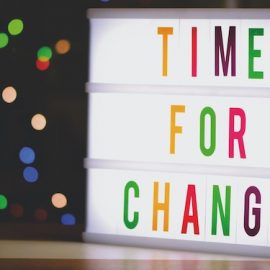

This article is an excerpt from the Shortform book guide to "Be Your Future Self Now" by Benjamin Hardy. Shortform has the world's best summaries and analyses of books you should be reading.
Like this article? Sign up for a free trial here.
Do you believe there’s room for improvement in your life? How do you set goals in life?
Goals help us keep track of our personal progress and push us in the right direction. In Be Your Future Self Now, Benjamin Hardy claims that setting life-changing goals is the key to reaching your fullest potential.
Continue reading to learn how to set goals in life that will change you for the better.
Clearly Identify Your Higher Self and How to Become Them
Hardy says the first step in shaping your present actions to benefit you long-term is to determine who you want to be. Imagine the happiest, smartest, most productive and successful version of yourself. Hardy emphasizes that your higher self must be based on what you desire most in life right now—not what society deems “successful” or what you think you should do.
To make your vision even clearer, you need to know how to set goals in life that are bold and risk-taking. Identify the big, life-changing goals that your higher self has accomplished—these are what you must attain.
For example, imagine you’re an unemployed student who gets good grades and designs graphics in your free time. Your higher self is a renowned graphic designer who earned undergrad and graduate degrees, got stellar grades, has an impressive portfolio, has designed graphics for major companies, and has numerous contacts in the industry. These accomplishments are the goals you must achieve to become your higher self.
(Shortform note: While Hardy recommends envisioning your higher self and the goals that will get you there, he doesn’t specify how to do so. However, Russ Harris provides detailed guidelines to help you envision your higher self and your goals in The Happiness Trap. Harris contends that you must consider your values and desires in 10 distinct areas of your life: family, romantic relationships, friendships, work and career, education and personal development, spirituality, citizenship and community, environment and nature, health and wellness, and leisure. This will help you identify what’s important to you in each major area of your life so you can create the clearest image of who your higher self is and what their life is like.)
Principle #1: Identify Your Five-Year Priorities
Once you’ve identified your higher self and accomplishments, Hardy’s next step is to identify three goals to prioritize over the next five years that will help you start to become your higher self. They should be priorities that you can realistically achieve in five years: It might not be possible to entirely embody your higher self in this relatively short time, but you can at least make progress. After the five years are up, you can set new priorities to bring you even closer to becoming your higher self.
For example, you might not be able to become a renowned graphic designer in five years based on your present circumstances, but you can make progress by getting your degrees with stellar grades and building an impressive portfolio. To accomplish this in five years, your top three priorities might be: (1) Complete your undergrad degree, (2) start a graduate program, and (3) begin freelance work designing logos for local businesses.
| Focus on One Thing at a Time In The One Thing, Gary Keller agrees that to achieve your purpose (or higher self) you should identify what needs to be done in the next five years. However, while Hardy recommends identifying three five-year priorities, Keller emphasizes that you should only select one. This is because focusing on one thing at a time and taking actions sequentially to achieve your purpose (rather than working on multiple sub-goals at once, as Hardy recommends) is more effective in maintaining motivation and productivity. Further, Keller argues that after identifying your five-year priority, you should identify a one-year goal (whereas Hardy recommends setting multiple one-year goals), a one-month goal, a one-week goal, and a one-day goal. Doing so will help you break down the actions you need to take to ensure you’re making progress every day. |
Principle #2: Identify Your 12-Month Goals
Next, Hardy notes, get more specific by setting 12-month goals for each of your three priorities along with clear “success” or “fail” conditions. This will ensure that you’re meeting the benchmarks necessary to accomplish your three priorities in five years.
For example, your 12-month goals for your first priority, finishing your undergrad degree, might be to find a professor who can mentor you, make a plan for which courses you need to take, and get a minimum grade of a B in each class. These are clear-cut goals—you can easily identify whether you’ve achieved them, and as a result, how well you’re progressing toward becoming your higher self.
(Shortform note: In First Things First, Stephen Covey recommends taking things a step further by creating weekly goals and plans that will help you work toward your long-term goals (like your 12-month goals). He explains that weekly plans are effective because they’re more actionable than long-term goals—they lay out what needs to be done on a weekly basis so you can plan out your days and ensure you’re making incremental progress. For example, your goal for the week might be to meet with your mentor for one hour to discuss the upcoming exam—this will work toward your 12-month goals of having a professor mentor you and receiving good grades in your classes.)

———End of Preview———
Like what you just read? Read the rest of the world's best book summary and analysis of Benjamin Hardy's "Be Your Future Self Now" at Shortform.
Here's what you'll find in our full Be Your Future Self Now summary:
- Why everyone must try to live up to their full potential
- How to identify your potential and the goals that will help you reach it
- Recommendations on how to become your highest self






